Our team of students have been employed as part of a pilot scheme to edit, check and create accurate subtitles for the University’s media content. The aim is to improve accessibility for those with hearing loss using media content published by the University. This pilot is the first of its kind, taking on an in-house team of student employees to trial this as a service.
Here we discuss what the role involves, who it helps and the success of the pilot so far.
Why does subtitling matter?
Primarily, having media accurately subtitled improves the accessibility of the content for anyone with hearing loss. Students at the University with hearing impairments may find it difficult to keep up with lecturers or tutorials, especially considering the acoustics in large lecture halls or the number of different speakers in tutorials. Factors such as background noise or gestures that obstruct parts of your face can influence the ability of someone with hearing loss to understand what you are saying. Having subtitles available for the University’s media content is a step in the right direction for providing equal access opportunities to all students.
In practice though, subtitles actually help us all. They allow us to watch a video in a noisy place or without headphones in a quiet place and still get all of the content. If you’re listening to someone with an unfamiliar accent and having trouble understanding them, subtitles help with that too. Lecturers and students here come from all across the globe so providing this service, particularly in a linguistically diverse context such as the University, actually has the potential to benefit many.
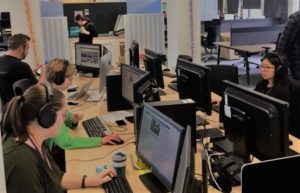
A day in the life of a Media Subtitling Intern…
From start to finish: we use an automated captioning service provided by our Media Hopper Create supplier (Kaltura), to create the initial subtitles for each media item. When the initial captions are returned our editorial work begins. Whilst automated services are improving they still encounter major issues such as speech and timing accuracy, sometimes even at the most basic level. As subtitling editors, our role is to check the content for these issues and correct any problems we find. Once the captions have been checked by an editor, the video is passed to another member of the team for peer review, which allows a second pair of eyes to check over the edited content. Peer review catches any issues that may have been missed first time round and ensures the highest quality of work then is returned to the content creator.
What content do we subtitle?
Anything that can be published on the University’s Media Hopper Create website – we’ve subtitled it. From hour-long recorded lectures, to inaugural lectures covering a vast range of topics; from medicine to maths, architecture to archaeology. We also subtitled short and snappy help and support content, covering all the ‘how-to’ guidance imaginable; from ‘how to apply for a visa’ to ‘how to use the University library’. The content is broad to say the least, but every media item we work on provides new challenges and new interest keeping us motivated and engaged.
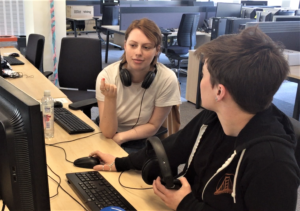
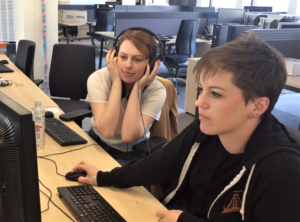
Is subtitling ever a challenge?
For the system…
The automated captioning system’s ability to churn out an accurate transcript depends on its ability to correctly recognise speech. Speakers come in all accent and style varieties so consistently accurate speech recognition is tough. The software learns from whatever accent and style varieties it is given as an input, as well as the kind of content, so when we feed it a video of a speaker with a familiar accent and familiar content it copes really well. When it’s unfamiliar it can really struggle and all sorts of gobbledegook shows up in the transcript.
For the editors…
Writing subtitles for natural speech presents more challenges than you may initially think. How do you transcribe a stutter or a mumbled word, for example? Often times when speaking we omit words or don’t finish full sentences, so when a speaker drops words or restarts mid-sentence you have to make a series of judgement calls about what to transcribe and how you should write it.
Because we subtitle a lot of lecture content we get a lot of technical jargon, and it can be both infuriating and intriguing to come across when editing. It can provide an opportunity to do a bit of research to find out about new terminology which, whilst time-consuming, provides a chance to learn something new. If the word is completely unrecognisable and even Google can’t give you any hints, it can be frustrating. When neither the editor nor peer reviewer can identify certain words, we pass the subtitles back to the content creator with a desperate plea to tell us what the mystery word is!
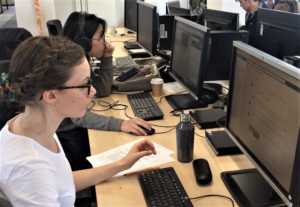
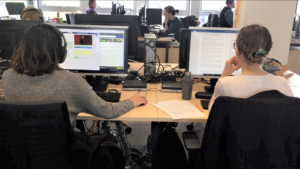
How successful has the pilot been so far?
As this is a pilot scheme we’re learning a lot on the job as we go; things like subtitling styles and procedures for taking a media item from start to finish, or even when things break or systems fail! We’ve had the chance to meet with the automated captioning software developers and learn more about how they design and develop the technology. It’s allowed us to discuss how we use the software in our role and provide some input on how it could be improved to meet our needs. This two-way communication between the developers and the software users has been great for allowing a more symbiotic development of this, still relatively recent, technology. By demonstrating how their system works we create a better understanding of how to use it and can feedback about its usability and accuracy in real time. It’s a development-cycle dream!
If we measure the success of the pilot in terms of the service we’re providing, we’ve had some fantastic feedback from the content creators about the quality of the subtitles we’ve produced. Many are glad to have the option to have subtitles produced and grateful to have the time-consuming task taken off their hands. We have a wonderful team of editors and have been welcomed into the ISG department and the pilot scheme with open arms. As a team we’ve felt valued and the work we produced is valued, so it’s surely been nothing short of a success so far.
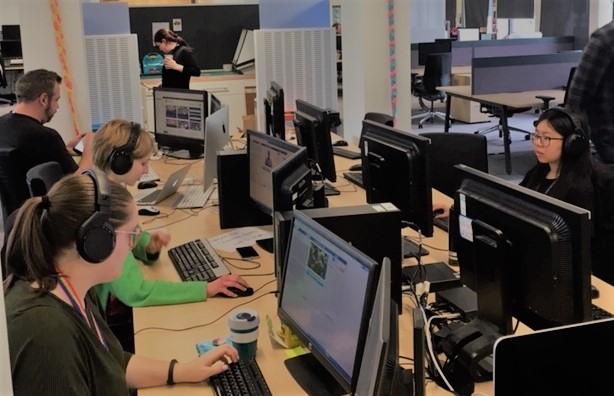


[…] Subtitles for the many; not the few […]